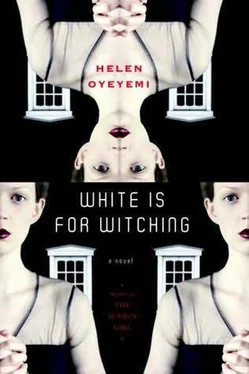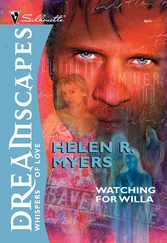The kettle boiled. She attended to her teapot, then said, “Me, mostly.”
I took the tea she offered me. It wasn’t bad. I tasted the smell of the rose petals more than anything else.
“Do you like them?” She pressed some rose petals into my hand. “Smell them on their own.”
I did, then reached over and sprinkled petals over her head. The withered pink clung to her hair, and she wrinkled her nose, but didn’t brush it away. She crossed her ankles and sipped at her tea.
I fought the impulse to tilt the chair I was sitting on onto its rear legs. I’d only fall over and look like an idiot.
“Tell me about that woman,” Miranda said. “The woman with the covered face?” She put a hand over her face and spread her fingers so that only her eyes shone through. “Is she your mother?” she asked.
Something told me that Miranda was talking about the soucouyant, that this girl looked at me and saw the soucouyant at my shoulder. I became very aware of the purple water in the pocket of my coat. I don’t know whether I was thinking about dousing myself in it or dousing Miranda. I thought, I’ve got to get out, but she stood up too and tapped my sleeve.
“Please don’t be cross,” she said.
“I was just being silly.” “I’m not cross,” I said. I sat down again and let her tell me about the project on her wall. The white-haired woman was Miranda’s great-grandmother, who had raised the short-haired laughing woman, who was Miranda’s mother. The girl in the old school photo was Miranda’s absentee grandmother. They were all dead.
“My mother had a condition called pica. She ate ladybirds and things,” Miranda said, reflectively. She glanced at me, then back at the picture of her mother. “I only just remembered that recently. And I’m forgetting all sorts of other things of my own.”
I tapped the photo of the boy and the girl. “And these two?” The boy looked out of place in his T-shirt and jeans — he had costume-drama looks, the whole dark windswept hair and scornfully curled lip thing. As if he belonged in a topcoat and tails, menacingly tapping a silver-topped cane. The girl was one of those Gothic victims, the child-woman who is too pretty and good for this world and ends up dying of tuberculosis or grief — a sweet heart-shaped face and a river of blue-black hair.
“That’s my twin brother,” Miranda said, touching the guy’s face. “He’s in South Africa.”
“And who’s she?”
Miranda sighed. “Very funny,” she said. She picked up her teacup. “That’s me. I suppose it’s quite an old picture. It was taken nearly two years ago.”
I stared at her, and when she didn’t smile to show she was joking, I looked at the picture again. I suppose I could have drawn an association from the black dress that the girl was wearing. But otherwise the girl in the picture was not the girl who stood in the room with me; I can unequivocally say that it wasn’t her. The eye colour matched, the hair colour matched, but that was all.
I found myself nodding uncontrollably
(get away from this girl and do not go near her again)
“You’ve… changed a lot,” I said.
She said, “Let’s go for that walk.”
I nodded again. Maybe it was just that I needed air. We stopped at the kitchen on my staircase while I filled a bag with food — bread, brazil nuts, brie, half of a dented pork pie, a six-pack of Cadbury Creme Eggs that I’d been saving since Easter for a special occasion and should probably have poisoned us. I wanted it to be a long picnic; if necessary, as long as we might have slept. Miranda sat on the kitchen counter and suggested fruit, so I added two of someone else’s apples and two of someone else’s oranges.
I didn’t have any particular direction in mind, and we ended up wandering towards Newnham Village, passing through the hedge corridor that led to Midsummer Common. It was around midnight and the passage was pitch-black; it ticked over with the sound of our footsteps on the leaves, and insects hissed above. Miranda was carrying the food, her steps were sure and she didn’t put her arms out to feel ahead. Not once. We didn’t really speak. Walking in the dark behind her there was a thing I noticed that can’t be true. It’s this:
Occasionally, to tease her for walking slowly, I’d put a hand to the small of her back and gently push her forward. Whenever I did, her hair swished over my fingers like torn silk. I felt this more than once, but I can’t explain it. Her hair only came down to her shoulders, but when I couldn’t see her clearly, her hair was very long.
When we came out of the hedge, we faced each other. In her stilettos she was taller than me. She asked, “So how is this going to work, are you going to kiss me?”
“No,” I said. I had been thinking about kissing her.
She seemed amused. “Why not?”
All I could give her was an “Um.”
She didn’t take her eyes from mine. “I’m not saying I’m amazing or anything, but I’m decent-looking. Why shouldn’t a decent-looking girl expect to be kissed?”
She sounded bold, but there was so much terror in her eyes. She thought I didn’t want her.
Walking over Midsummer Common at night on minimal sleep is like trying to cross a place-between without a map. You suspect that you might be walking back in the very direction that you came from. It doesn’t feel like Cambridge. It doesn’t feel like anywhere. The ground is suspended and the sky pins it down on one corner, like an elbow. You can hear the river, and feel how close the running water is. We knelt down on our coats, nibbling at olives — now I remember there were olives — then sat cross-legged for the sandwiches and pie, then lay down with the chocolate and the apples. I’d never been so hungry — it tied in to my tiredness somehow, the tautness I felt in my arms and back. We were both very rude. We lay facing each other, eating like mad, each stuffing cheese fast and hard, as if to prevent the other from getting more than their share.
“Hall food really is rubbish,” Miranda said. She had finished everything and was eating the peel of her orange.
I picked up a piece of my own orange peel and considered it lazily. “Are you sure that’s alright to eat?”
“It’s just a bit harder to digest, that’s all.”
“If you say so, Miranda.”
“Tell a story,” she said. She scratched the ground and began eating earth. I began to think I was dreaming.
“What are you doing? You’ll get sick.”
She looked quizzical, but let me take her hands and wipe them on the grass. The mud around her mouth. She ate without smudging her lipstick.
“I’m already sick,” she said. She held up her arm and closed her thumb and second finger around her elbow. Which she shouldn’t have been able to do. I didn’t wince, but it was close. “You can see exactly how sick I am. That’s why you don’t want to touch me.”
I said, “Miranda.”
“For a year I’ve been trying and trying to fill out the dresses I wore before I got ill. And I just can’t,” she said. “Please tell a story about a girl who gets away.”
I would, even if I had to adapt one, even if I had to make one up just for her. “Gets away from what, though?”
“From her fairy godmother. From the happy ending that isn’t really happy at all. Please have her get out and run off the page altogether, to somewhere secret where words like ‘happy’ and ‘good’ will never find her.”
“You don’t want her to be happy and good?”
“I’m not sure what’s really meant by happy and good. I would like her to be free. Now. Please begin.”
I was silent. I couldn’t think of a single story she would want to hear.
Finally she sighed and said, “Alright. What’s your favourite story?”
Читать дальше












